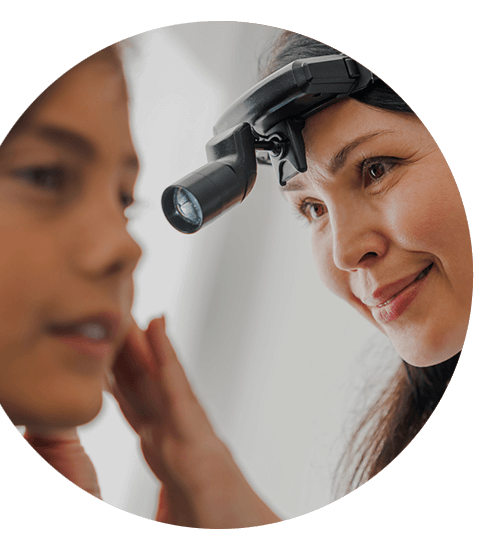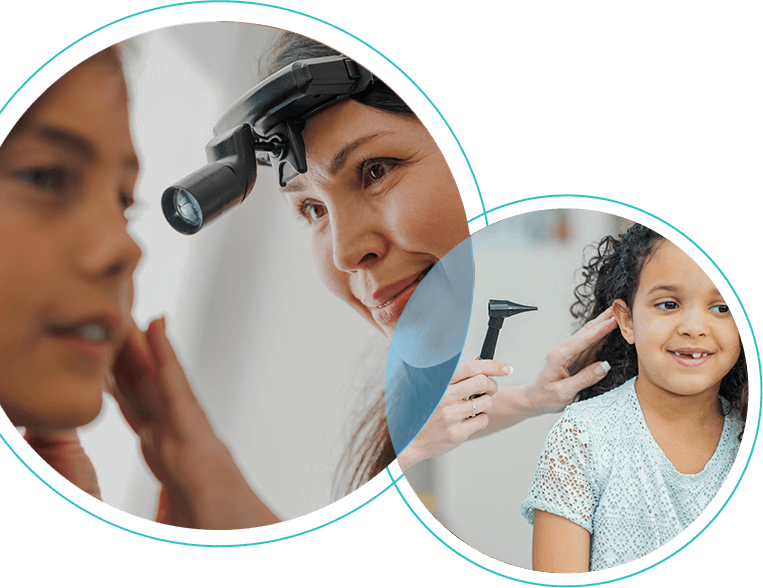How common is auditory processing disorder?
The number of school-aged children suffering with some type of APD is estimated to be between 2-7%; however, according the National Institutes of Health, in children with learning disabilities this number has been found to be closer to 43%.
What causes auditory processing disorder?
The exact causes of APD are still unknown. Research suggests possible links to several factors. These include premature birth or low birth weight, head trauma, chronic ear infections and lead poisoning, to name a few. Auditory processing disorder can be associated with conditions affected by genetic traits, such as various developmental disorders.
Why test for APD?
- Undiagnosed APD could be a factor in your child’s academic struggles- it could be the primary source. It is important to identify if APD is present. This is why when APD is suspected, the first step in the process is to see an Audiologist that is specially trained in the diagnosis and treatment of APD.
- Undiagnosed APD can be the missing puzzle piece causing delays and/or failure to progress in other therapies targeted at remediating language and/or learning disorders. Once APD is identified, and supported and treated, we will often begin to see progress move forward in other areas.
- It is not enough to assume some type of APD is present based on observed behavior characteristics or low scores on auditory screening tests. A complete APD diagnostic test battery performed by an Audiologist trained to evaluate APD is required in order to diagnose what type of APD is present. In order to target the APD effectively we need to know where the break down is occurring in the central auditory processing pathways. For example:
- All individuals with APD will have difficulty hearing in noise, however, the reason why (and how to target remediation and support) will be different depending on which type of APD is present.
- Decoding deficit will have trouble hearing in noise because they can’t quickly and accurately process speech at a phonemic level.
- Integration deficit will have difficulty hearing in noise because the two ears are not processing speech in a balanced manner and that imbalance (or delay) causes difficulty hearing in noise or remembering what is heard.
- Prosody deficit will have difficulty hearing in noise because the timing or patterning of speech sounds are not processed accurately causing extraction of key information to be missed or misunderstood.
- Therefore, how we would go about helping these individuals to hear better in noise would be directly related to what type of APD deficit is present. Appling a one size fits all approach to all APD patients will most often miss the mark and may prove ineffective. A deficit specific diagnosis (what type of APD is present) allows us to understand what type of difficulties a person is likely to be challenged with and what type of interventions will be most effective.
What does APD look like?
Just a few examples of the issues we see with APD:
- APD is typically more apparent and more of a problem in noisy environments or while listening to complex information
- Individuals with APD often have difficulty paying attention to and remembering information presented to them verbally
- Individuals with APD often have difficulty executing multi-step directions
- They have poor listening skills and may need more time to process information
- Individuals with APD may have low academic performance and may have behavior problems
- They may demonstrate language difficulties and they often have difficulty with reading, comprehension, spelling, and vocabulary
- APD, left untreated, can have a significant learning, language, communication, social & emotional impact on a child’s life (continuing into adulthood). Treating APD opens up choices and options in life that might be otherwise too challenging due to the limitations imposed by APD.
My doctor says he thinks my health insurance may pay for APD testing-is that possible?
Most PPO health insurance policies will have some benefits for parts of an APD diagnostic evaluation. As with most Specialty Clinics, BHSD is considered an “Out-of-Network” provider for a majority of PPO plans. This means your insurance provider will reimburse you directly for whatever benefit amount your particular policy provides. Specialty clinics will expect payment at time of service and will provide patients with a detailed invoice which includes all the billing codes needed in order for you to submit to your insurance provider for reimbursement. Reimbursement amounts will vary depending on carriers/policies.
Most HMO health insurance plans do not have benefits for specialized services, such as, APD testing. This is why popular HMO plans do not offer APD testing in their Audiology departments. They will refer out to private practice Audiologists. On some occasions patients have been successful in receiving some insurance reimbursement from HMO plans by requesting pre-certification prior to their visit. Be aware that pre-authorization/certification is not a guarantee of payment and BHSD does not accept assignment of insurance benefits-patients will still be required to pay in full at time of service. Insurance reimbursement payments are strictly between you and your insurance provider.
We understand that in today’s health insurance environment we all desire to utilize the insurance we are required to maintain; therefore, we do our best to provide accurate CPT billing codes and ICD-10 diagnosis codes in order to maximize your ability to receive the most reimbursement your individual policy allows. While most insurance providers will not disclose a monetary amount in advance, they will often verify whether they do cover specific procedure codes. Typical codes used for APD assessments may include:
- CPT 92557
- CPT 92570
- CPT 92567
- CPT 92620
- CPT 92621
In order to help keep costs to patients down we do not contract with insurance providers; however, in order to assist our patients with the cost of specialty diagnostic testing we do offer interest free 3rd party financing plans allowing our patients to pay for services in low monthly installment payments (some restrictions apply).
See Patient Resources-Insurance & Financing
Why do I need to see an Audiologist for APD testing when my child has already been tested by the school?
School testing (not performed by an Audiologist) is usually part of a comprehensive assessment process which may include speech & language, occupational therapy, psychological, and academic assessments.
Many different types of specialists that work with individuals in related areas (such as, Speech-Language Pathologists, Psychologists, Physical/Occupational Therapists, Optometrists, Educational Specialists, etc.) are trained to identify the symptoms and possibility of the presence of some type of APD. If in the process of their testing or interactions with a child they suspect the possibility of APD, this child will be referred to an Audiologist specifically trained in the diagnosis of APD.
Audiologist’s are often included as part of an IEP team if auditory issues are suspected. Only an Audiologist, a specialist in the auditory system, can determine if a child has APD. It is through this comprehensive diagnostic process, utilizing deficit specific APD testing, that the Audiologist can determine where the auditory processing system weaknesses lie. Once diagnosed, this information is a critical component in guiding the focus areas for effective intervention and treatment for your child.
My child was tested and diagnosed with APD when they were very young-why would I want to have them re-tested now that they are older?
It is possible to screen children as young as 5 years old for the presence of APD; however, it is difficult to provide a deficit specific diagnosis prior to age 7 years old. The benefit of early screening is we are able to begin general management & accommodations of APD in these interim years. Once they are older re-testing is beneficial because we are able to attain detailed diagnostic information. This more fine-tuned information is useful in recommending more specific accommodations & compensatory strategies as well as direct intervention & treatment(s) targeted at remediating their specific area of auditory weakness.
Depending on when your child was tested, they may not have a deficit specific diagnosis (what type of APD). Knowing this information today can lead to better and more effective treatment recommendations and interventions.
As children grow their central auditory system also matures and develops. Re-testing allows for evaluation of these changes and how it is affecting their APD. Re-testing also allows for further fine tuning and/or adjusting of therapy and interventions in order to maximize effectiveness.

 Why test for APD?
Why test for APD? Just a few examples of the issues we see with APD:
Just a few examples of the issues we see with APD:




